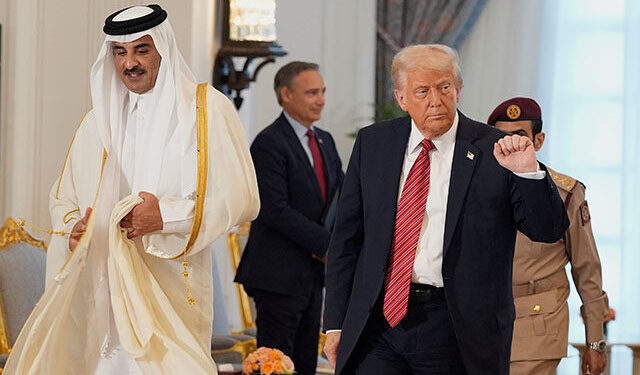While much of the media fixates on political drama, President Donald J. Trump is busy making big moves overseas that actually benefit working Americans. On Wednesday, during his high-profile Middle East trip, President Trump landed a historic agreement with Qatar — one that’s expected to generate a massive $1.2 trillion in economic exchange between the two countries.
The deal, signed in Doha following his departure from Saudi Arabia, marks one of the most significant international economic partnerships in recent memory.
“Today in Qatar, President Donald J. Trump signed an agreement with Qatar to generate an economic exchange worth at least $1.2 trillion,” the White House said in a fact sheet following the signing.
But that’s not all — beyond the broader agreement, U.S. and Qatari companies struck individual deals totaling $243.5 billion, sparking major economic momentum across sectors from aviation and defense to advanced technology.
At the center of the deal is a staggering $96 billion agreement between Qatar Airways, Boeing, and GE Aerospace. The Gulf nation will purchase up to 210 American-made Boeing 787 Dreamliner and 777X aircraft, all powered by GE Aerospace engines — a move that sets a new industry record.
“This is Boeing’s largest-ever widebody order and largest-ever 787 order,” the White House noted.
And the impact here at home? 154,000 U.S. jobs supported annually, totaling over 1 million American jobs throughout the production and delivery cycle. That’s not just business — that’s economic revival.
These jobs span manufacturing, engineering, parts suppliers, and airport infrastructure — and they will inject life into communities across states like Washington, Ohio, and South Carolina, where many of these aircraft components are produced and assembled.
Other major pieces of the agreement include:
- Parsons Corporation secured 30 new projects worth $97 billion, focusing on infrastructure and development.
- Al Rabban Capital and Quantinuum entered a joint venture investing up to $1 billion in cutting-edge quantum technologies and workforce training in the United States.
This means more innovation and more future-ready jobs being built right here on American soil — a bold contrast to the offshoring of the past.
On the security front, the Trump administration didn’t pull any punches. Alongside Qatari leadership, the U.S. signed a joint declaration of cooperation, and Defense Secretary Pete Hegseth inked several military-focused deals with his Qatari counterpart.
Among them:
- A $2 billion purchase by Qatar of MQ-9B unmanned aircraft from U.S.-based General Atomics.
- A $1 billion counter-drone defense system agreement with Raytheon.
- A statement of intent to deepen the nations’ security partnership, outlining $38 billion in potential defense investments, including support for the Al Udeid Air Base, air defense upgrades, and maritime security.
This defense cooperation cements Qatar as a strategic ally in the region — and further solidifies America’s role as a leader in global security and stability.
This enormous U.S.-Qatar deal came just one day after the Trump administration signed another $142 billion arms deal with Saudi Arabia. In just two days, President Trump brought in nearly $1.4 trillion in foreign investment and defense commitments — all while strengthening international ties and building up the American workforce.
At a time when other administrations might focus on symbolic gestures, President Trump is focused on results — bringing real dollars, real jobs, and real security back to America.




















